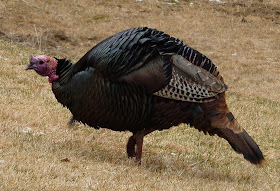Cabbage Soup
- Put some water in a pan and turn it on high.
- Slice a head of cabbage into shreds and add to the water.
- Chop up some Polish Sausages and add to the pot.
- Let it simmer until the cabbage is soft.
The sausage provides the flavor. I'm sure there are other meats or sausages that would work just as well. My family likes it just like that, without any additional seasoning. You can add more salt, or pepper. I once added curry powder to it and that was really good, adding a little kick. I've also added carrots on occasion. It's a recipe you just can't mess up!
My mother has always taught me how good for us cabbage is. If you feel like reading on, I'll include parts of a couple of articles that give some healthy details:
From an article titled Health Benefits of Cabbage, Aparup Mukherjee says this:
"The health benefits of cabbage include treatment of constipation, stomach ulcers, headache, excess weight, skin disorders, eczema, jaundice, scurvy, rheumatism, arthritis, gout, eye disorders, heart diseases, aging, and Alzheimer's disease."And here's a great E-Zine article by Dr. Linda Posh (parts have been omitted):
The Health Benefits of Cabbage
Sadly, most American households wrinkle their noses at the mere mention of this valuable, all powerful and sorely misunderstood vegetable. The word cabbage is usually enough to send children to their rooms with a myraid of excuses as to why they may not wish to eat their evening meal. While cabbage is a delicious and healthful staple in other countries, it is almost foreign to Americans, with the exception of good old fashioned cole slaw. Do recognize that this American cabbage specific, mayonnaise laden dish full of hydrogenated oils and other unmentionables, absolutely ruins the reason for eating such a healthful food in the first place.
...Rich in nutrition and fiber, cabbage is an absolutely phenomenal source of Vitamin C. Even more impressive is that cabbage is famous for a specialized, naturally occurring, nitrogenous compound known as indoles. Current research indicates that indoles can lower the risk of various forms of cancer.
...An early Roman medicinal preparation blended lard with the ashes of burnt cabbage to make an ointment for disinfecting wounds. ...Epidemiological studies have found that men living in China and Japan experience a much lower rate of prostate cancer than their American counterparts. Similar data has been uncovered regarding breast cancer rates among women.
It is no wonder that the lowly, plain, boring cabbage gets rave reviews from the world of nutritionists. Cabbage is relatively cheap yet one of the richest when it comes to protective vitamins. Talk about the original weight loss food! One cup of cabbage contains only around 15 calories.
Cabbage is rich in the following nutrients:
Vitamin A: responsible for the protection of your skin and eyes.
Vitamin C: an all important anti-oxidant and helps the mitochondria to burn fat.
Vitamin E: a fat soluble anti-oxidant which plays a role in skin integrity.
Vitamin B: helps maintain integrity of nerve endings and boosts energy metabolism.
Modern science has proven beyond a reasonable doubt that the health benefits and therapeutic value of cabbage, which also plays a role in the inhibition of infections and ulcers. Cabbage extracts have been proven to kill certain viruses and bacteria in the laboratory setting. Cabbage boosts the immune system's ability to produce more antibodies. Cabbage provides high levels of iron and sulfur, minerals that work in part as cleansing agents for the digestive system.
Cabbage can be grown about anywhere in the world, it's inexpensive, and very healthy. What a great way to add to your self-reliance!
Cabbage can be grown about anywhere in the world, it's inexpensive, and very healthy. What a great way to add to your self-reliance!


















































